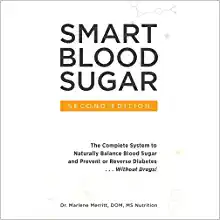Smart Blood Sugar Best Review Second Edition (Updated)
Smart Blood Sugar Second Edition is a comprehensive approach to targeting the underlying causes of erratic blood sugar. This simple program cuts through all the confusing and contradictory information and zeroes in on the exact steps to take right now to control blood sugar levels. Dr. Marlene makes everything simple with her smart blood sugar plan. Inside its pages, readers will find step-by-step guidance, easy tools, and dozens of tips on how to maintain healthy blood sugar levels… and repair insulin resistance without spending a fortune on food or wasting a lot of time or money. Diabetes is a concern for many.

This Second Edition of Smart Blood Sugar offers readers the chance to learn the basic lifestyle and dietary changes. This diabetes book provides a simple understanding to help prevent, manage, and promote a health reversal. Dr. Merritt presents a simple, scientific solution for managing blood sugar, improving diabetes fitness, as well as other related conditions. Without an overwhelming amount of scientific jargon, this book includes expanded topics and more recent research on the subject of diabetes. You will gain an understanding of our sugar-saturated culture, and be led towards better health and a better quality of life. Start your path forward with having a healthy blood sugar for life.
Understanding Smart Blood Sugar:
Smart Blood Sugar is a term that has gained significant popularity in recent years. It refers to a comprehensive approach to managing blood sugar levels intelligently and efficiently. By adopting a Smart Blood Sugar strategy, individuals can make informed choices about their diet, exercise, and overall lifestyle to keep their glucose levels within a healthy range.
Balanced Nutrition for Smart Blood Sugar:
When it comes to managing blood sugar levels, nutrition plays a crucial role. Adopting a balanced diet that focuses on whole foods can make a significant difference in controlling glucose levels. Here are some key principles to consider:
- Emphasize Low Glycemic Index (GI) Foods: Consuming foods with a low glycemic index helps prevent rapid spikes in blood sugar levels. Opt for whole grains, legumes, and non-starchy vegetables to maintain a steady release of glucose.
- Include Lean Proteins: Protein-rich foods such as fish, poultry, tofu, and legumes help stabilize blood sugar levels and promote satiety. Incorporating these into your meals can provide a steady source of energy.
- Incorporate Healthy Fats: Choose monounsaturated and polyunsaturated fats like avocados, nuts, and olive oil. These fats have a minimal impact on blood sugar levels and contribute to heart health.
- Portion Control: Pay attention to portion sizes to prevent overeating. Consistently consuming more calories than your body needs can lead to weight gain and adversely affect blood sugar control.
Physical Activity and Smart Blood Sugar:
Regular physical activity is an integral part of any Smart Blood Sugar strategy. Exercise not only helps manage weight but also enhances insulin sensitivity and promotes overall well-being. Here are some recommendations for incorporating physical activity into your routine:
- Aerobic Exercise: Engage in activities that get your heart pumping, such as brisk walking, jogging, cycling, or swimming. Aim for at least 150 minutes of moderate-intensity aerobic exercise each week.
- Strength Training: Including resistance exercises in your fitness regimen helps build muscle mass, which aids in maintaining healthy blood sugar levels. Work with a certified trainer to develop a suitable strength training program.
- Flexibility and Balance: Don’t forget to incorporate exercises that improve flexibility and balance, such as yoga or tai chi. These activities promote overall fitness and reduce the risk of falls.
Lifestyle Considerations for Smart Blood Sugar:
Beyond nutrition and exercise, certain lifestyle factors can impact your blood sugar levels. Here are some important considerations:
- Stress Management: Chronic stress can raise blood sugar levels. Implement stress-reduction techniques like deep breathing, meditation, or engaging in hobbies you enjoy.
- Sufficient Sleep: Aim for seven to eight hours of quality sleep each night. Inadequate sleep can disrupt insulin sensitivity and lead to imbalances in blood sugar levels.
- Regular Monitoring: Keep track of your blood sugar levels with a glucometer or other monitoring devices recommended by your healthcare provider. Regular monitoring helps you understand how your body responds to different foods and activities.
-
Medication Adherence: If you are on medication to manage your blood sugar levels, ensure you take it as prescribed by your healthcare professional. Adhering to the recommended dosage and schedule is crucial for effective control.
If you want to buy this product Link is given below: